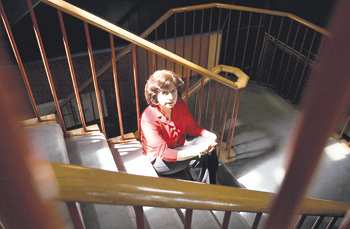They teach a message of forgiving
Forum shares stories of two who lost loved ones at the hands of others and their capacity to forgive.
Caption - picture on right: Leticia Aguirre spoke about her experiences with forgiving one of her son’s murderers during the Forum of Forgiveness at All Saint’s Church in Pasadena Saturday morning. -- Alex Collins / News-Press
Leticia Aguirre and Ben Kayumba,
strangers to each other whose native countries of Mexico and Rwanda are
separated by an ocean and a world of cultural differences, share a
tragic bond — both know how it feels to lose a family member to murder.
Aguirre, a longtime Glendale resident, lost her son Raul Aguirre on May
5, 2000, when he tried to break-up a gang-related scuffle outside Hoover
High School. Raul, who was not in a gang, got caught in the mix and a
knife meant for another boy ended up in the 17-year-old's heart.
Kayumba's mother, father and more than
150 of his extended family members — and the vast majority of those
living in their village — were slain by Hutu rebels during the 1994
Rwandan Genocide, he said.
Their stories were the focus of Forum on Forgiveness, a two-day event
hosted by Glendale-based nonprofit organization In His Shoes Ministries,
at All Saints Church in Pasadena on Saturday.
Aguirre has told her story numerous times in the past seven years, but
its lesson is timeless, said Fr. Vazken Movsesian, In His Shoes
Ministries executive director.
"It is the most profound and moving story I've ever heard," Movsesian
said.
For Aguirre, the story begins with dinner preparation on a usual Friday
afternoon in 2000.
Raul was late coming home from school, she said. Just as Leticia Aguirre
started to worry, the phone rang and brought news that her son was hurt
in a fight.
Three hours later, after a team of doctors failed to save the boy on the
operating table, Raul died, she said.
"That moment was the most horrible in my life," Aguirre said, through a
translator. "I felt that I would die, but the worst is that I didn't
die, that I had to live on second by second."
And second by second for three years, Aguirre endured the trials of her
son's killers.
"Every day of that trial I was there and I wanted justice to be done,"
Aguirre said. "In court I saw the mothers of the gang members kissing
crosses and praying to God to forgive their sons and I thought how
difficult this must be for God."
But when Rafael Gevorgyan, one of three gang members tried for being
involved in Raul's death, begged Aguirre's forgiveness on the final day
of his trial, she gave it to him, she said.
"I saw a boy, almost a child, in a situation so grave asking for
forgiveness," she said. "I felt huge compassion and huge tenderness."
To this day, Aguirre sends and receives letters from Gevorgyan, who is
serving a maximum 18-year prison sentence for manslaughter. Aguirre is
hoping that a pending appeal that would shorten Gevorgyan's sentence is
granted, she said.
Kayumba, who works for a nongovernmental organization in Rwanda, shared
on Saturday a similarly tragic account of the death of his mother — who
was stripped naked, stabbed in the chest, and left in the village center
to be scavenged by dogs, he said.
When Kayumba, who had escaped his village before the raids in 1994,
returned to his home, few traces of his community remained, he said.
The only relics were stories of his family members' deaths told by a few
survivors, one of which pointed Kayumba to his mother's killer. In a fit
of rage, Kayumba found the man, engaged him in a violent scuffle, but
held off when he realized that he was moments from perpetrating the same
act he sought to revenge.
"What I was going to do is what he did, so I asked him for forgiveness,"
said Kayumba, recalling his message to his mother's killer. "He was just
shaking."
Kayumba and Aguirre's story left many in the All Saints Church audience
shaking and teary as well.
"It's actually traumatizing listening to these stories," said Donald
Miller, executive director of the Center for Religion and Civic Culture
at USC, who moderated Kayumba's testimony. "There's a sense that if you
let these stories seep into your soul, you're never quite the same."


